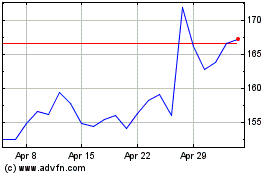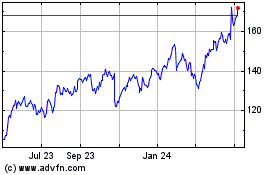Google to Invest $10 Billion in India -- Update
July 13 2020 - 9:44AM
Dow Jones News
By Eric Bellman
Alphabet Inc.'s Google is tightening its ties to India with a
$10 billion fund to profit from the country's digital evolution and
prove it shouldn't be shut out by protectionist policies.
India may be one of the last great untapped digital markets
because roughly about half of its 1.3 billion people have yet to
get online. It is expected to see the largest increase of new
people on the internet in the coming years. Policy makers in New
Delhi have been trying to use that opportunity to attract more
investment while at the same time support and protect local
startups.
Alphabet had been one of the first American tech companies to
see the potential for great growth in the South Asian nation, but
it hadn't been the one with high profile events and acquisitions
promising multibillion dollars investments. The new fund -- dubbed
the Google for India Digitization Fund -- will help policy makers
see the benefits of welcoming Google.
As the latest in a line of tech titans to target India, Google
said Monday that it has launched the fund to invest the money over
the next five to seven years through equity investments and
partnerships, as well as in infrastructure.
"This is a reflection of our confidence in the future of India
and its digital economy," said Sundar Pichai, chief executive of
Google and Alphabet, said Monday at Google's annual event
showcasing its business in India, which was held online.
He said the investment would focus on four areas: affordable
access in local Indian languages, new products and services aimed
at Indians, helping businesses get online, and using technology to
promote social issues including health and education.
Google, which has had operations in India since 2004, is
increasing its commitment to the country as other big America
names, including Facebook Inc., Amazon.com Inc. and Walmart Inc.,
have made multibillion-dollar investment plans in the country.
"India's moment has arrived," India's Minister of
Communications, Electronics and Information Technology, Ravi
Shankar Prasad, said at the Google online event. "I am very happy
that Google is recognizing the great power of India's digital
empowerment, India's digital innovation and the need to create
further opportunity."
Google saw the opportunity in India and the many developing
markets in the world -- where people have been getting online in
growing numbers through their phones -- earlier than most.
It has been designing products and modifying its services to
better accommodate what it calls the "next billion users." These
new users are more likely to use inexpensive smartphones with
little memory space and be connected to slow cellular networks.
It has created versions of its apps which use less data, let
people who are only online occasionally download YouTube videos to
watch later and help those less familiar with keypads and English
search for content using voice and multiple Indian languages. To
accommodate the country's millions of motorcycle and scooter
drivers, it added a Google maps function to calculate how long
trips will take on a two-wheeler.
One of its most successful services launched in India has been
its digital payment app, Google Pay. It was designed for the less
affluent Indian consumer and has been downloaded more than 180
million times and used to transfer billions of dollars.
While India is stuck in the middle of one of the world's worst
coronavirus outbreaks -- with more than 800,000 people infected
only the U.S. and Brazil have been harder hit -- and its economy is
shrinking for the first time in decades, Google isn't the only tech
titan turning to the country in tough times.
In April, Facebook announced a $5.7 billion tie-up with an
Indian mobile leader in hopes of tapping into the country's vast
potential, particularly in e-commerce.
Amazon is investing $5 billion to expand its India operations.
Walmart bought India's biggest homegrown e-commerce firm, Flipkart,
for $16 billion in 2018.
The global brands are laying out massive investment plans even
as New Delhi has increasingly been announcing restrictions and
requirements on how foreign companies can operate in India and
store data.
Some Indian politicians and local tech entrepreneurs would like
to see India do more to protect its market from foreign companies
like China does so that some local champions could emerge.
Last month, in one of New Delhi's most aggressive moves, it
banned the use of 59 Chinese apps, citing cybersecurity concerns.
The move was seen as payback for a bloody hand-to-hand battle
between the troops of the two countries at their disputed border
high in the Himalayas. At least 20 Indian troops died.
Beijing-based Bytedance Ltd.'s short video sharing app TikTok,
which had been downloaded more than 660 million times in India, was
on the list.
Write to Eric Bellman at eric.bellman@wsj.com
(END) Dow Jones Newswires
July 13, 2020 09:29 ET (13:29 GMT)
Copyright (c) 2020 Dow Jones & Company, Inc.
Alphabet (NASDAQ:GOOGL)
Historical Stock Chart
From Mar 2024 to Apr 2024

Alphabet (NASDAQ:GOOGL)
Historical Stock Chart
From Apr 2023 to Apr 2024
